Selecting the Best Gaming PC: A Comprehensive Guide
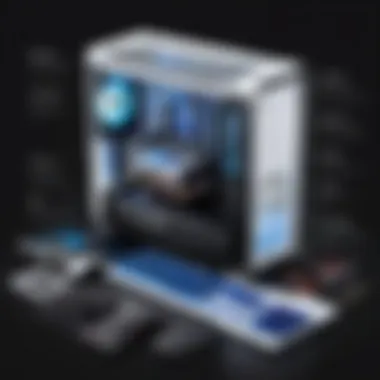
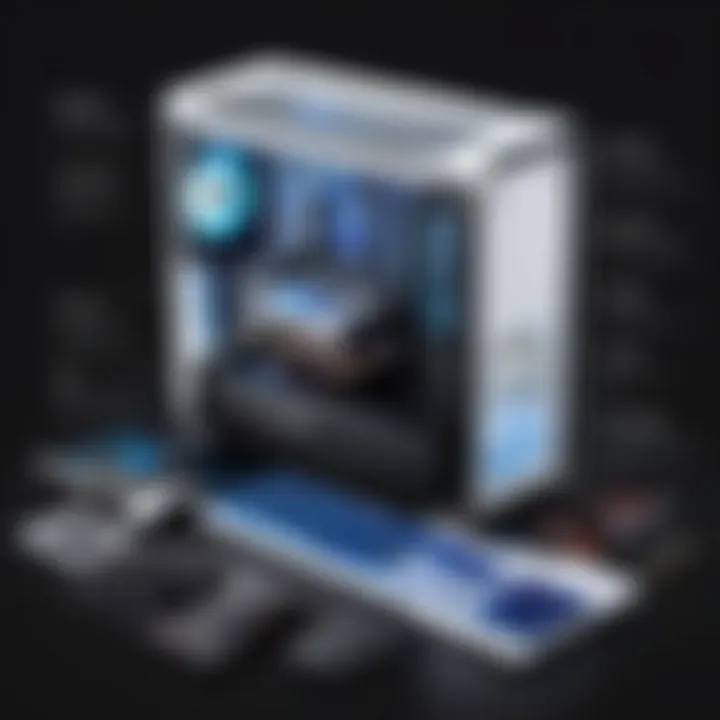
Intro
In the world of gaming, the choice of a gaming PC can mean the difference between smooth gameplay and frustrating lag. With an overwhelming number of brands, specifications, and customization options available, selecting the right gaming PC is no small feat. This guide dives into the essential factors that can guide your purchasing decisions, ensuring you're well-equipped to make an informed choice. From key components that significantly impact performance to understanding available benchmarks, this article aims to illuminate the path for both seasoned enthusiasts and newcomers alike.
Product Overview
When it comes to gaming PCs, understanding the product landscape is crucial. An optimal gaming rig is composed of various parts that each play a unique role in delivering unparalleled performance. Here, we'll highlight key brands and specifications to consider.
Brand Information
Several brands dominate the gaming PC market, and knowing their reputation can help guide your choice. Notable names include Alienware, ASUS ROG, and MSI, known for their robust offerings tailored to gamers. Each brand has carved a niche with unique features, often appealing to different types of users. For example, Alienware is renowned for its striking design and solid build quality, while ASUS focuses heavily on user customization options.
Key Specifications
When selecting a gaming PC, one must delve deeper than just the surface. Key specifications to look for include:
- Processor (CPU): Typically, a high-performance Intel Core i7 or AMD Ryzen 7 is desired for gaming.
- Graphics Card (GPU): A powerful GPU, like the NVIDIA GeForce RTX 3080, is crucial for high frame rates and superior graphics.
- RAM: Aim for at least 16GB of RAM; 32GB is preferable for optimal multitasking.
- Storage: SSDs (Solid State Drives) are recommended for faster load times, with at least 512GB capacity.
Pricing
The price of gaming PCs can vary widely. Lower-end systems might start around $700, while high-performance setups can easily surpass $3000 depending on the specifications. Understanding your budget will help narrow the field significantly. Keep an eye on seasonal sales; deals often pop up around Black Friday or during back-to-school sales, making it a perfect time for procurement.
Performance Comparison
When deciding on a gaming PC, you should always consider benchmark tests. These tests assess performance and help you compare different setups.
Benchmark Tests
By analyzing test results from gaming benchmarks, buyers can see how different configurations handle demanding games. Higher scores typically indicate better performance. Gaming videocard sales often feature technology like ray tracing, which has become a cornerstone of modern gaming.
Speed and Efficiency Comparisons
Speed isn't just about frame rates; efficiency plays a crucial role in ensuring long-term usability. Look for systems that combine high clock speeds with energy-efficient components, as this can lead to a more sustainable gaming experience. Systems boasting technologies such as AMD’s Smart Access Memory provide notably enhanced efficiency and speed in performance.
Features and Technology
Today's gaming PCs come packed with advanced features that enhance the overall gaming experience. Understanding these can aid in making the right choice.
Unique Features
Some features that stand out include customizable RGB lighting, which not only looks appealing but can also be synchronized with in-game actions. Cooling solutions such as liquid cooling can also improve performance by keeping the CPU and GPU temperatures in check during intense sessions.
Technological Advancements
Keep an eye out for advancements like PCIe 4.0, which offers faster data transfer speeds for the latest graphics cards. Additionally, systems equipped with the latest Wi-Fi standards (like Wi-Fi 6) ensure better online gaming experiences with reduced latency.
Compatibility with Other Devices
Before settling on a system, check compatibility with peripherals. For example, some gaming mice and keyboards benefit from proprietary software that enhances functionality only when paired with specific brands. This is essential for creating a seamless gaming ecosystem.
Pros and Cons
Like any product, gaming PCs have their strengths and weaknesses that potential buyers should consider.
Strengths of the Product
- High-level graphics performance for immersive gameplay.
- Customizability allows users to tailor according to specific preferences.
- VR readiness supports the latest gaming trends.
Areas for Improvement
- Initial costs can be prohibitive for newcomers.
- Upgrading components can sometimes be complex, especially in pre-built systems.
- Certain brands may have inconsistent customer service experiences.
Value for Money
In the end, it all boils down to value. Are you getting your money's worth? The interplay of price, performance, and longevity should factor heavily into your decision-making process.
Cost-Effectiveness
In some cases, spending a bit more upfront can save you from costly upgrades down the road. An entry-level gaming rig may seem budget-friendly, but it might require replacements sooner than a more powerful system.
Long-Term Benefits
Investing in quality components often translates to a better gaming experience over time, and the associated benefits of performance improvements first seen now will only pay dividends years later.
Comparison with Similar Products
It's worth noting performance comparisons across similar models. Doing so can highlight where a particular system excels or falters, enabling a more round view of your choices.
"Understanding your specific gaming needs can illuminate the best path forward, allowing you to navigate the often baffling world of gaming PCs with clarity and confidence."
By taking stock of these essential elements, tech enthusiasts and gamers alike can make a well-informed selection that aligns perfectly with their particular gaming aspirations.
Understanding Gaming PCs
In today’s fast-paced, visually rich gaming world, understanding what a gaming PC is and how it differs from standard computers is fundamental. The notion of performance, speed, and graphics fidelity comes into play prominently when one talks about gaming. This section is pivotal as it lays the groundwork for what prospective buyers must consider when looking into gaming systems. It’s not just about functionality; knowing the purpose and the primary elements of these machines can significantly enhance the gaming experience.


Definition and Purpose
A gaming PC is a type of computer specifically designed to handle demanding video games at high settings compared to a standard PC. These machines are equipped with powerful hardware that can deliver superior performance, offering smoother gameplay and breathtaking graphics. The heart of a gaming PC beats strong by integrating components that can handle heavy processing tasks, often including a robust CPU, a capable GPU, ample memory, and efficient cooling systems.
The purpose behind setting up a gaming PC is manifold. Firstly, gamers often seek performance that allows for immersive experiences, such as virtual reality gameplay or expansive open-world environments. Secondly, with the rapid evolution of games, which often require greater resources as they grow in complexity, having a solid gaming rig ensures longevity and relevance. Ultimately, when one invests in a gaming PC, it's about future-proofing their gaming adventures.
Key Differences from Standard PCs
When distinguishing gaming PCs from standard computers, various elements come into play.
- Hardware Specifications: Gaming PCs feature advanced processors and graphics cards. Standard PCs often have integrated graphics and less processing power. A high-performance GPU, for instance, can be the difference between a game that runs smoothly and one that stutters and lags.
- Upgrade Potential: Gamers typically desire the ability to upgrade components seamlessly. Gaming PCs are built with this in mind, often allowing users to replace a GPU or add more RAM without much hassle. In contrast, standard PCs may limit these upgrade options due to compatibility issues.
- Cooling Solutions: Gaming computers emphasize effective cooling systems as their components generate substantial heat under load. While standard PCs often use basic cooling fans, gaming machines may utilize liquid cooling or specialized air cooling. Maintaining optimal temperature is crucial for performance and longevity.
- Design and Aesthetics: Many gaming PCs are designed with visual flair in mind, featuring RGB lighting, transparent cases, and other aesthetics to reflect the gamer’s personality. Standard PCs prioritize functionality over form, often resulting in bland systems that prioritize efficiency and cost.
These differences are not trivial; they highlight a commitment to performance and user experience that any enthusiast would appreciate.
"Understanding these distinctions can help guide your purchasing decisions and ensure you select a machine that meets your gaming needs adequately."
In summary, a comprehensive understanding of gaming PCs is critical for anyone looking to invest in such technology—whether it’s for casual gaming, competitive eSports, or just to enjoy the latest graphics-rich titles. This section establishes the importance of recognizing what makes a gaming PC a worthy investment for serious gamers.
Essential Components of a Gaming PC
Selecting the right gaming PC is akin to assembling a finely tuned orchestra. Each piece plays a vital role in delivering an outstanding performance. The components form the backbone of your gaming experience, impacting everything from frame rates to load times. Understanding these essential elements not only enables you to choose wisely, but it also enhances the overall enjoyment of gaming.
Processor (CPU)
Importance of Speed and Core Count
The CPU is often considered the brain of your gaming rig. Its speed, measured in gigahertz (GHz), and core count ripple through every task you perform. The more cores and higher speed usually mean better multitasking, which is especially crucial for modern gaming titles that may use more resources at once.
For instance, high-core count CPUs can run games smoothly while also handling background tasks, like streaming or voice chat, with ease. A processor with 6 cores might seem sufficient for basic gaming, but 8 or more cores provide a more robust experience, reducing bottlenecks during intense gaming sessions.
Intel vs. AMD
The debate between Intel and AMD is akin to choosing between two legendary athletes. Both brands offer top-tier CPUs, but each has its unique advantages. Intel is often heralded for its superior single-core performance, making it great for games that rely heavily on speed.
On the flip side, AMD usually offers more cores for the same price, providing value for those looking to multitask or use their PCs for more than just gaming. Think of Intel as the high-speed track star, while AMD is the versatile all-rounder. Depending on your priorities, either might suit your gaming needs perfectly.
Graphics Card (GPU)
Difference Between Integrated and Dedicated Graphics
The graphics card is the heart of any gaming experience. Integrated graphics are built into the CPU and help handle basic video output, while dedicated graphics cards are separate units designed specifically to manage high-quality graphics and rendering.
Dedicated graphics cards offer much better performance, enabling you to enjoy games with stunning visuals at higher resolutions. For serious gamers, a dedicated GPU is less of an option and more of a necessity. Not only do they handle graphics-intensive tasks better, but they also support more advanced features like real-time ray tracing.
Popular Brands and Models
When it comes to dedicated graphics cards, a few names regularly stand out. NVIDIA and AMD lead the charge, with NVIDIA’s GeForce series and AMD’s Radeon lineup each boasting impressive power. For example, the NVIDIA RTX series is celebrated for its cutting-edge ray tracing capabilities and DLSS technology, while AMD's RX series is often praised for offering competitive performance at lower price points.
Choosing a brand or model ultimately hinges on your specific requirements, game choices, and, of course, your budget.
Memory (RAM)
Capacity Requirements
RAM, or Random Access Memory, is crucial for performance. For most modern games, 16GB of RAM is often considered the sweet spot. This amount allows seamless multitasking and ensures games run smoothly. However, there's the option of jumping to 32GB if you're planning on using your gaming PC for resource-heavy tasks like video editing or streaming.
While more RAM doesn’t always translate directly to better gaming performance, it does offer leeway for future titles and multi-application use.
Impact on Performance
The performance impact of RAM cannot be overstated. Insufficient RAM can lead to slower load times and stuttering graphics. If your system is running on less than optimal RAM, you might find yourself lagging behind in those competitive online matches. So, investing in sufficient RAM isn’t just smart; it’s essential for staying in the game.
Storage Solutions
HDD vs. SSD
When considering storage, you face a choice between HDDs (Hard Disk Drives) and SSDs (Solid State Drives). HDDs offer more storage for less money but can be sluggish in comparison. Imagine trying to retrieve a file from a messy office versus a clean drawer; that’s the difference in speed you get. SSDs, while pricier, provide faster load times and improved system responsiveness, making them a popular choice for gamers.
Storage Capacity Considerations
Assess your storage needs carefully. If you're dabbling in a few titles, a smaller SSD might suffice. But for those who collect games like stamps, a larger HDD could be necessary. Balancing these two options is key: a smaller SSD for your main games (enhancing load times) paired with an HDD for everything else might be the best of both worlds.
Motherboard Compatibility
Choosing the Right Form Factor
Motherboard choice is often overlooked, yet it's vital for ensuring compatibility with other components. Typically, you’ll encounter ATX, microATX, and mini-ITX form factors. The size impacts the number of available expansion slots. For a custom build, ensure your case accommodates your motherboard choice; it can lead to issues down the line if not matched.
Connectivity Options
Another aspect to consider is how well the motherboard connects to components. Look for options like USB-C ports, the number of USB ports in total, and Wi-Fi capabilities. A motherboard with good connectivity ensures you can access everything you need without hassle.
Cooling Systems
Air Cooling vs. Liquid Cooling
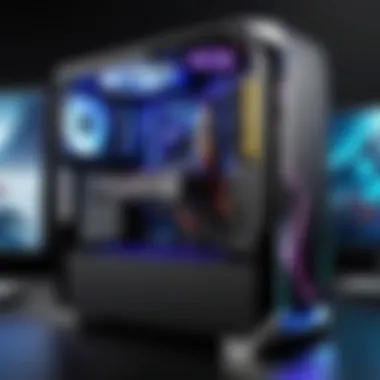
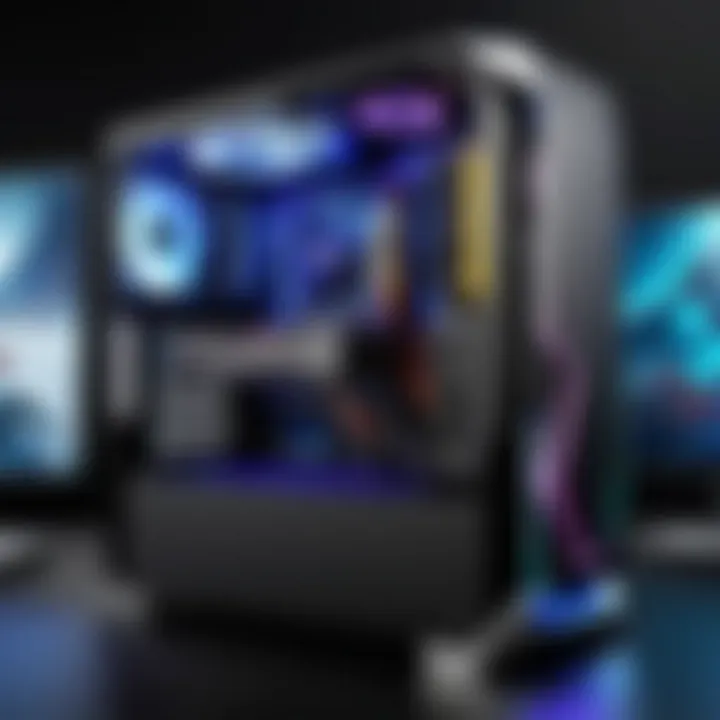
Cooling is essential, as heat can impede performance. Air cooling is simpler, cheaper, and generally sufficient for most users. However, liquid cooling offers superior heat dissipation, ideal for those pushing their systems to the limit while gaming. Liquid systems can be complex to install but often provide a more aesthetic setup, with customizable RGB lights adding flair to your build.
Importance of Adequate Cooling
Adequate cooling isn’t just about comfort—it's crucial in preserving the life of your components. Excessive heat can reduce the lifespan of the CPU or GPU. If your system frequently throttles performance due to heat, you’ll feel the impact in your gameplay, losing that competitive edge when it matters most.
Power Supply Unit (PSU)
Understanding Wattage Requirements
The PSU provides power to your entire system. Understanding the wattage requirements is crucial for selecting a suitable unit. A rough guideline is to ensure that your PSU has at least 20-30% more wattage than your system's estimated demand. This extra cushion can accommodate additional components or overclocking without causing the PSU to struggle.
Efficiency Ratings
When selecting a PSU, pay attention to efficiency ratings, such as Bronze, Silver, Gold, or Platinum. Higher efficiency ratings translate to less wasted electricity and typically longer life spans for your unit. A Gold-rated PSU might cost more upfront but can save money on energy bills in the long run and provide better performance stability.
Evaluating Performance Metrics
Evaluating performance metrics is pivotal when selecting a gaming PC, as it directly influences the gaming experience. Failing to consider these metrics can lead where the capabilities of the machine do not align with the demands of the games you wish to play. Things like how fluidly a game runs, the level of detail you can enjoy, and the overall responsiveness of the system are all tied to performance metrics. High frame rates, resolution, and solid benchmarking contribute not just to numbers, but to the enjoyment and immersion of the gaming experience.
Frame Rate Considerations
Frame rate, often abbreviated as FPS, is a central element in gaming performance. Essentially, it refers to how many frames your PC can render every second while playing a game. A higher frame rate means smoother gameplay, which is especially critical in fast-paced games. For example, many competitive gamers aim for a minimum of 60 FPS, as it provides an edge in terms of responsiveness.
However, exceeding 60 FPS can further enhance the experience on high-refresh-rate monitors, pushing up to 144 FPS or beyond. This means every movement feels more fluid, making it easier to react quickly. But, it is crucial to remember that achieving these frame rates demands robust hardware capable of high performance.
Resolution Scaling
Resolution scaling determines how clear and detailed the visuals appear in games. More traditionally, resolutions like 1080p, 1440p, and 4K are commonly discussed. Higher resolutions allow for more detail in the image, essentially letting you see textures and environments vividly.
However, the trade-off is that higher resolutions put a strain on the GPU. A graphics card has to work harder to push more pixels, and this could affect the frame rates described earlier. It’s a balancing act; you want clarity without sacrificing performance. The sweet spot often lies within 1440p for many gamers, as it provides a noticeable upgrade from 1080p without requiring the most extravagant rigs to maintain performance.
Benchmarking Tools
Popular Benchmarking Software
Benchmarking software plays a crucial role in testing your gaming PC's capabilities, helping you assess whether it meets your gaming needs. Some of the most notable tools include 3DMark, Unigine Heaven, and FurMark. These programs push your hardware to its limits, providing meaningful numbers to which you can compare.
One key characteristic of benchmarking tools like 3DMark is their ability to generate a score based on the average FPS, peak frame rates, and overall graphical fidelity during tests. This information is invaluable for tech enthusiasts aiming to understand where their system sits in the performance hierarchy.
A unique feature of 3DMark is its comprehensive library of testing scenarios, catering to various hardware levels and gaming requirements. While this software offers many advantages, it is also essential to interpret the results correctly, as scores could vary significantly based on the system's configurations.
How to Interpret Benchmark Results
Interpreting benchmark results enables you to make sense of the raw data generated. A higher score may indicate that your system can handle modern games better, but what does that truly mean? Key characteristics to focus on include the average FPS, minimum FPS under load, and whether the performance holds steady during intensive scenes.
A unique feature in interpreting these results is understanding the difference between synthetic benchmarks and real-world performance. For instance, a system may score exceptionally well on 3DMark, yet struggle with a real game due to poor optimization of that game for your hardware.
Being able to interpret these results appropriately gives you a clearer picture of how your investment is holding up under pressure and can guide future upgrades or changes to settings in games.
"Understanding how to interpret performance metrics allows gamers to optimize their systems fully and creates a better gaming experience overall."
Budgeting for a Gaming PC
Establishing a budget for a gaming PC is a fundamental step that often determines the performance and longevity of your investment. Navigating the world of gaming hardware can feel like walking through a bustling market, filled with enticing options and, let's be honest, sometimes overwhelming prices. A well-thought-out budget not only restrains impulse buying but also allows for a methodical approach that maximizes your spending power. It’s about striking a balance between your desires and your financial reality.
Setting a Realistic Budget
When diving into the budget, it’s crucial to start with an honest evaluation of your finances. Think of this not merely as a number, but as an investment in both your gaming experience and potential productivity. For instance, if you're aiming for high-resolution gaming at top frame rates, your budget needs to reflect that ambition. Many experts recommend a starting range, such as $800 to $1500 for a capable machine, while hardcore gamers may consider $2000 or more. This bracket allows for flexibility in component selection and future upgrades.
Also, crafting a budget isn’t just about the final figure; it’s wise to include potential additional costs like peripherals—a good monitor, mechanical keyboard, or quality headphones. This way, you avoid the pitfall of undershooting your total expenses. Don't forget to factor in software that may come with your gaming setup as well.
Balancing Quality and Cost
Now let’s discuss the art of balance—melding quality with cost effectively. One of the most critical aspects of your gaming rig is the graphics card. While it’s tempting to opt for the latest model, it’s vital to assess what you really need versus what you want. A mid-tier card might offer more than enough power for a 1080p build without bankrupting your wallet. Here’s a breakdown of how to recognize where to splurge and where to save:
- Identify Your Gaming Preferences: If you play graphically demanding titles, prioritize your GPU. If not, spend less and opt for a moderate card.
- Look for Deals and Promotions: Frequently, brands like NVIDIA and AMD have sales or offer last-gen models that still pack a punch.
- Consider Refurbished Options: Sometimes, gently used products can provide phenomenal savings without steep performance drops.
Consideration of Upgrades
Lastly, let’s touch upon the importance of planning for future upgrades in your gaming PC budget. Ideally, your initial setup should allow room for enhancements down the line, ensuring that your gaming rig remains relevant in an ever-evolving market.
When budgeting, think about components that can be easily replaced or expanded. For instance:
- Motherboard Selection: Choose a motherboard that supports additional RAM and can accommodate newer CPUs. This helps avoid an entire system overhaul.
- Power Supply: A PSU with a headroom of around 100 watts over your projected usage enhances longevity and allows stability for future expansions.
- Affordable Upgradable Parts: Investing in a good cooling system or extra RAM can yield improvements without needing a complete replacement later.
The right budgeting strategy can lead to substantial savings over time, ensuring that your gaming rig remains formidable for several years to come.
In all, setting a successful budget involves strategic planning, historical research, and an understanding of your gaming ambitions. By applying these principles, you can ensure that your gaming PC excels not just in performance but also in value.
New vs. Used Gaming PCs
When it comes to acquiring a gaming PC, understanding the pros and cons of new versus used systems is paramount. The choice can greatly affect your gaming experience, wallet, and even your long-term satisfaction with the purchase. It's easy to get lost in brand names and flashy specs, but the first step in making an informed decision is to grasp the core differences and implications tied to new and used options. Exploring these avenues can help you find a system that meets your needs without breaking the bank.
Advantages of Buying New
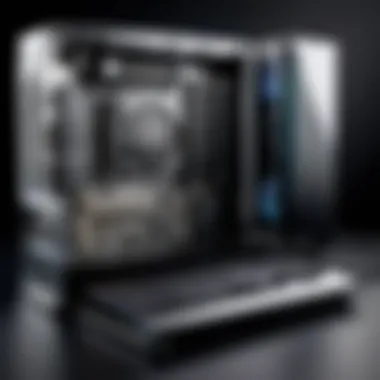
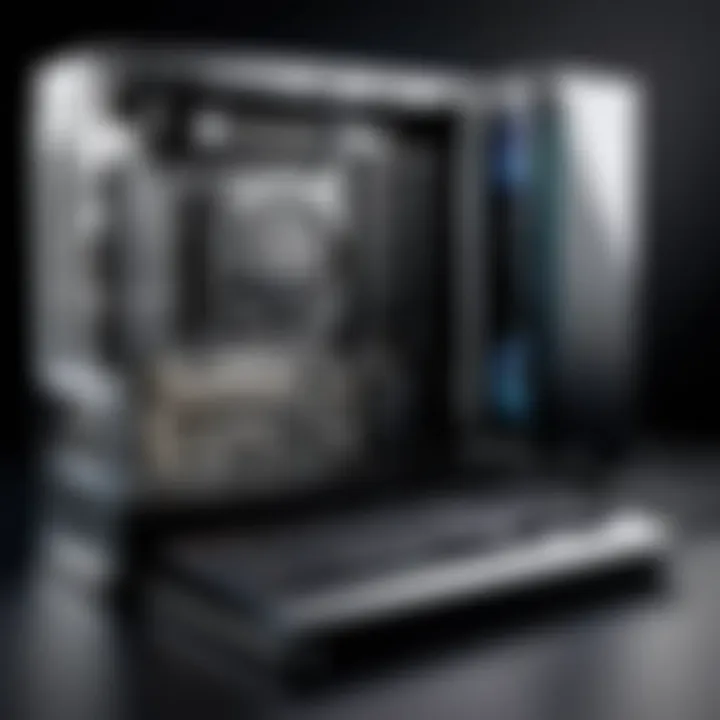
Purchasing a new gaming PC has its share of benefits, particularly for those looking for reliability and peak performance. Here are few key advantages:
- Latest Technology: New gaming PCs often come equipped with the latest CPUs, GPUs, and faster RAM. This grants you access to the most advanced features and capabilities, allowing for smoother gameplay and better graphics.
- Warranty: Most new systems come with a manufacturer's warranty, often covering parts and labor for at least a year. This added protection can save you from unexpected repair costs, providing peace of mind.
- Customizability: Buying new sometimes allows for broader customization options. You can opt for specific hardware that fits your personal gaming style.
- Better Performance: Generally, new systems perform better right off the assembly line. You won’t have to worry about wear and tear impacting your gaming experience, which often comes from older parts.
Ultimately, choosing a new gaming PC means investing in longevity. The latest components not only ensure you're set for current games but also more adept for future releases.
Risks and Rewards of Used PCs
Diving into the used market can be a double-edged sword—it presents opportunities as well as substantial risks. Ged ready for some ups and downs when considering this path:
- Lower Costs: The primary allure of buying used is, of course, the price tag. You can save a considerable amount, sometimes scoring high-end components for mid-range prices.
- Historical Performance: If you’re lucky, you might find a gem that has been well-cared for. Systems that are sold with their original packaging and receipts often indicate better upkeep.
- Challenge of Finding Deals: Used PCs can be like finding a needle in a haystack— you need to sift through listings and make careful assessments. The potential for a deal is there, but make sure to assess the risks.
- Potential Hidden Issues: Used systems might come with undisclosed problems. A savvy buyer will verify the condition through benchmarking tools and inspection, but it’s often hard to guarantee the state of internal components and overall longevity.
As you navigate this terrain, weigh the financial savings against the potential repairs and shorter lifespan you might encounter. Both avenues have their merits, depending on your gaming needs and budget.
Custom-Built vs. Pre-Built Systems
The decision to go with a custom-built or pre-built gaming PC is a significant one, shaping not just how games are played but also the overall experience of gaming itself. This choice often boils down to the user’s preferences, skills, and budget. Each option has its own merits and pitfalls, making it essential for potential buyers to understand the nuances before diving in.
Benefits of Custom Building
When diving into the world of custom gaming PCs, the first advantage that comes to mind is personalization. Unlike pre-built systems, custom builds allow gamers to select each component with precision. If a high-end graphics card or specific motherboard catches one’s eye, it's simple to make it a part of the setup. This tailor-made approach means there's a greater possibility of achieving optimal performance tailored specifically for the games you love. Custom builds can also incorporate the latest technology, which can ensure that the rig remains relevant longer than off-the-shelf models.
Moreover, assembling a PC can be an educational experience. Gamers who opt for custom building often gain a deeper understanding of how every component works together. This knowledge can be invaluable for troubleshooting issues down the line or for planning future upgrades.
Advantages of Pre-Built Options
Pre-built gaming PCs come with their own set of advantages, making them a viable choice for many users. The most clear-cut benefit is convenience. With a pre-built system, everything arrives ready to go—there's no need to spend time researching individual components or wrestling with assembly instructions. For someone who is not tech-savvy, this can save both headaches and time, allowing you to jump right into your favorite games.
Convenience and Support
When discussing convenience and support, it’s hard to overlook the peace of mind that comes with a pre-built system. If something goes awry, manufacturers typically provide support services that can guide users through troubleshooting processes. This characteristic can be a game-changer for those unfamiliar with hardware issues. The ability to simply reach out for help is often a strong argument in favor of pre-builts, especially for casual gamers who want to avoid the technical intricacies involved in DIY builds.
Warranties and Guarantees
In terms of warranties and guarantees, pre-built systems shine prominently as well. Many manufacturers offer warranties that cover parts and labor, meaning that if something fails, it gets fixed without sweeping costs. This safety net can be appealing, providing assurance to many first-time buyers. Furthermore, having a coherent warranty structure can simplify the process of addressing compatibility issues or performance concerns, sparing users from additional stress.
"Selecting between a custom-built and pre-built gaming PC isn't just about performance—it's about the experience and support you desire."
In buying pre-built systems, consumers often get reliable components bundled together, reducing the likelihood of problems related to compatibility. However, buyers should be mindful that pre-built systems might come with proprietary parts that make upgrades a bit more complex in the future compared to standard components available in custom builds.
In summary, whether a buyer chooses to forge their path with a custom build or take the route of convenience with a pre-built option, understanding the benefits and considerations of each will empower them to make the most informed decision possible.
Future-Proofing Your Investment
As technology advances at a relentless pace, ensuring that your gaming PC remains relevant becomes an essential consideration for any gamer or tech enthusiast. Future-proofing is all about making informed decisions today to safeguard your investment for tomorrow. This section will delve into the nuances of future-proofing, highlighting its importance, the specific elements to consider, and the benefits it brings to your gaming experience.
Understanding Technological Trends
Keeping up with technological trends is critical when selecting components for your gaming PC. The gaming industry evolves constantly; new graphics cards, processors, and software emerge regularly, which can render older hardware obsolete. An astute buyer must pay attention to the trajectory of these advancements.
For instance, the recent shift towards ray tracing technology and AI-driven graphics means that the graphics cards available today might become less capable of handling future titles that utilize these features. By selecting a GPU that supports these cutting-edge technologies, you extend the usability of your system.
Additionally, monitor refresh rates and resolutions are inching upward, with 4K and even 8K gaming gaining traction. This means that your choice of components should accommodate these advancements.
In short, stay informed about:
- Upcoming hardware releases
- Market trends
- Developer preferences in designing games
This knowledge ensures your gaming setup meets future demands, allowing you to enjoy the latest offerings without the need for constant upgrades.
Choosing Upgrade-Friendly Components
The term "upgrade-friendly" speaks volumes in the realm of gaming PCs. It reflects the design philosophies adopted by manufacturers focused on longevity and adaptability. Here are some key factors to consider:
- Modular Designs: Opt for motherboards and cases that allow easy swaps of components. For example, a case that supports additional drives makes it simpler to upgrade storage without replacing the entire setup.
- Socket Compatibility: Choosing a CPU with a compatible socket that isn’t phasing out anytime soon leads to more options down the line. AMD’s AM4 socket, for example, has supported multiple generations of processors.
- Future-Proof RAM: While 16GB of RAM may be standard now, 32GB might be where you want to go to ensure your system remains robust. Look for motherboards with additional slots so you can easily add more RAM in the future.
- PSU Headroom: Selecting a power supply unit that exceeds current wattage requirements leaves room for future upgrades. This prevents the hassle of needing a new PSU when you decide to upgrade your GPU or add custom cooling solutions.
- Cooling Options: If you're into overclocking or planning larger upgrades, consider devices with more robust cooling systems. Liquid cooling, while often seen as a luxury, can be a necessity for future heavy usage.
Always put a premium on compatibility and potential. A well-thought-out configuration today can eliminate headaches down the line.
With the right choices today, you’ll spend less time worrying about how your gaming rig stacks up against future releases, allowing you to focus on what genuinely matters: the gaming experience itself.
Finale: Making an Informed Purchase
In the realm of gaming, purchasing the right PC can often determine your experience. The conclusion of this article emphasizes the necessity of making an informed purchase. With countless options available, knowing what suits your needs best can save you both time and money. The decision essentially hinges on several intertwined elements including performance metrics, budget, and a thorough understanding of components.
It's essential to keep in mind that investing in a gaming PC isn't merely about acquiring the latest hardware. It’s about finding the balance between what you need today and what you'll want tomorrow. As technology progresses, ensuring that your build is capable of future upgrades can extend its life significantly.
Recap of Key Considerations
As you stand on the verge of a purchase, a speedy recap can work wonders. Consider the following points:
- Specifications vs. Needs: Assess whether high-end specifications align with how you plan to utilize the gaming rig. For instance, if your gaming sessions are casual, a top-tier graphics card might not be necessary.
- Budget Constraints: Ensure your budget allows for room to maneuver. Sometimes, skimping on a component can lead to further costs down the line.
- Brand Reliability: Familiarize yourself with brands that offer good customer support and warranty services. Not all picks promise the same reliability.
- Future-Proofing: Opt for components that keep the door open for upgrades. A slightly pricier motherboard that supports new standards can pay off in the long run.
- User Reviews and Benchmarking: Research and rely on empirical data provided by user reviews and benchmarks. They can offer insights you just won’t find on the spec sheet.
Final Thoughts on Selection Process
As you finalize your decision, it’s critical to reflect on the journey you've undertaken. The selection process, while often overwhelming, can turn into a rewarding experience if approached with diligence. Evaluate the importance of each component and understand how they contribute to your gaming experience. More than just picking items off a list, think about the synergy between components and how they integrate to create a seamless performance.
In short, entering the gaming landscape armed with knowledge empowers you to make selections that not only meet your current demands but also set you up for the gaming adventures of tomorrow. Remember, a well-informed chooser is a victorious gamer.
"The right tools can be the difference between success and starting over."
With these insights in mind, you are now better equipped to make a decision that aligns perfectly with your gaming aspirations. Happy gaming!







